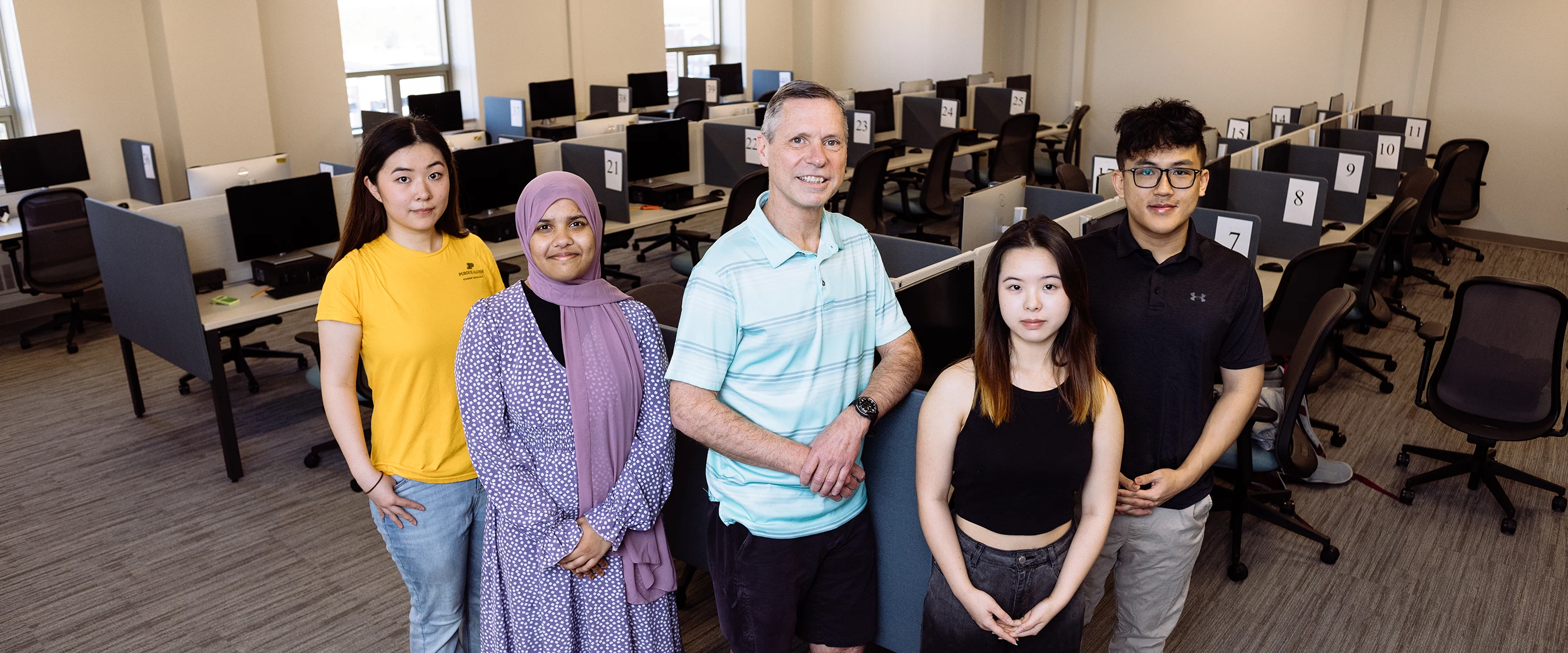
A renovated research lab, a new major, minor and behavioral economics center, and a visit from an eminent, Nobel-prize winning experimental economist. These are a few of the exciting developments underway at Purdue University’s Economics Department, which has a long tradition of excellence in research and mentorship and is a pillar of the university’s business school.
What is not new at the Mitchell E. Daniels, Jr. School of Business Economics Department is the valuable experience students gain working as research assistants.
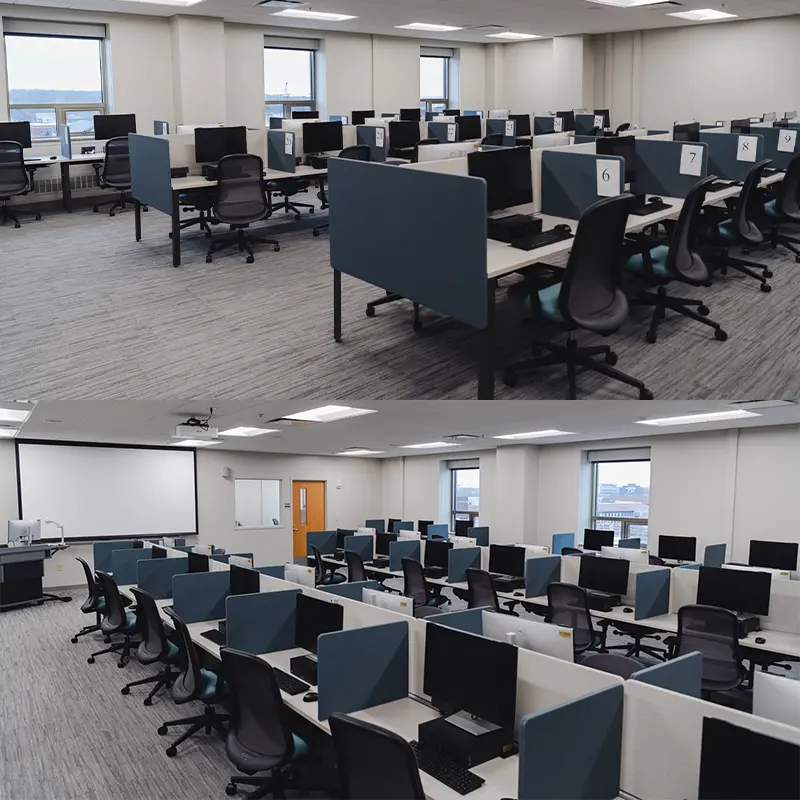
The Daniels School recently remodeled and expanded its renowned Vernon Smith Experimental Economics Laboratory (VSEEL), on the 7th floor of the Krannert Building. Named for Nobel Memorial Prize in Economic Sciences recipient Vernon Smith, the lab is a place for undergraduate volunteers to assist with research, run experiments and recruit paid student-participants campus-wide.
Hundreds of students — volunteers and experiment participants — find themselves in the lab every month, says VSEEL Director Tim Cason.
Cason, the business school’s Gadomski Chair of Economics and a distinguished professor of economics, says the lab experience is important because it shows research assistants how behavioral and experimental economic research is actually done.
“We study markets, games and other strategic interactions, as well as individual behavior on economic choices,” he says.
Cason admits a student’s lab to-do list starts off somewhat mundane. Tasks include logging into the 40 computers, distributing instructions, answering student-subject questions and “running around the lab, doing what I need help with,” Cason says. “That’s where they start.” Those who commit move up to paid positions analyzing and cleaning data and coding software for new experiments.
Many of his lab research assistants are economics majors; some are Business Analytics and Information Management majors. Cason often gets student referrals from game theory professors.
“What I like about this experience, and what I’ll point out to students, is volunteering as a research assistant gives them an opportunity to see how modern research is done,” Cason says. “I was a student subject 35 years ago, so I have a soft spot for this.”
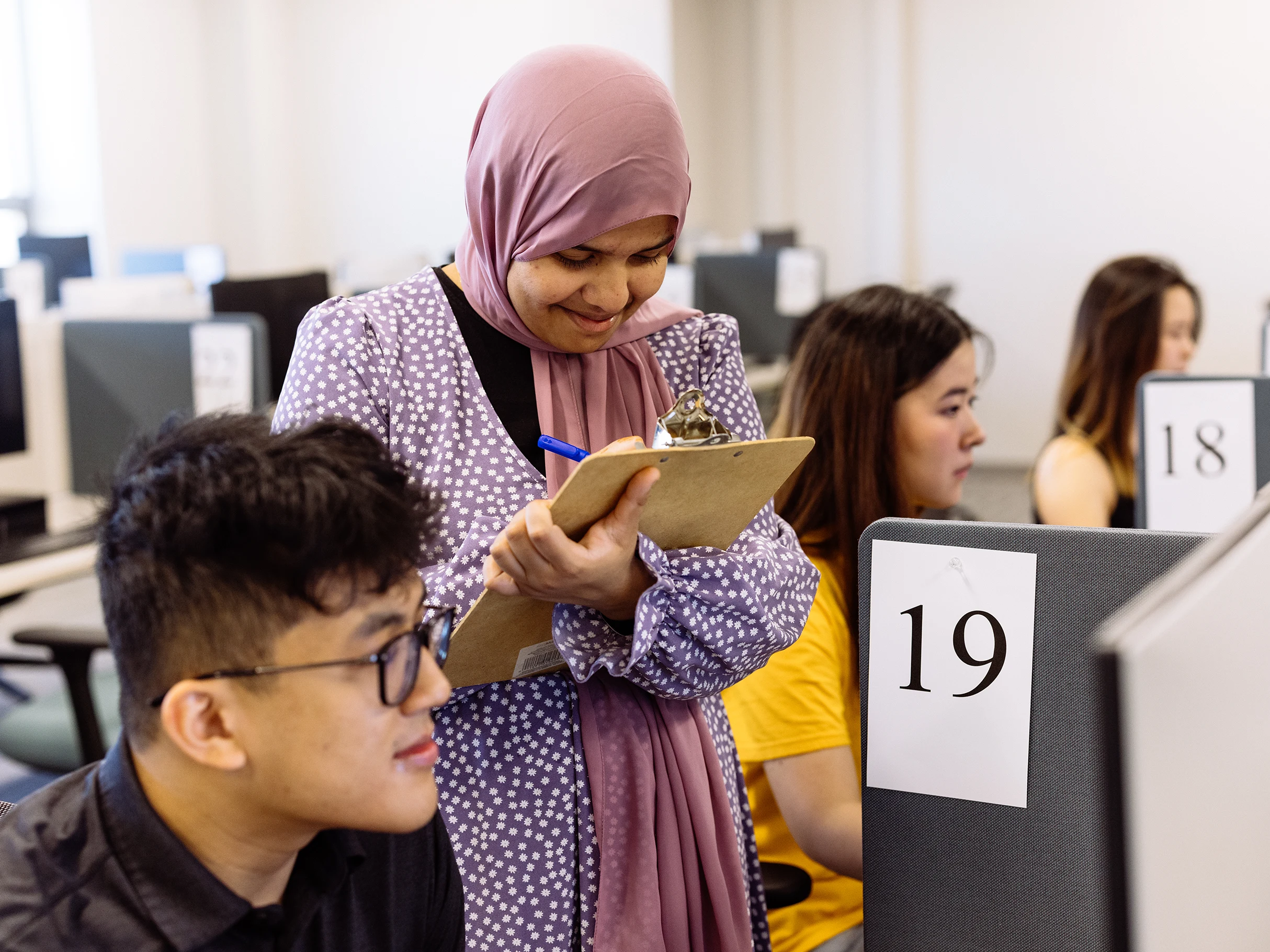
Kiet Hoang, Economics '25, at left, and Sana Mariya, Economics '25, with clipboard, work in the VSEEL lab.
“Volunteering as a research assistant gives students an opportunity to see how modern research is done," says Tim Cason, director of the lab. "I was a student subject 35 years ago, so I have a soft spot for this.”
Students can and do contact faculty directly in search of hands-on research work.
Joseph (Hasun) Choi graduated from Purdue in 2022, majoring in Mathematics and Statistics and Economics Honors, and went on to earn his master’s in public policy from the University of Chicago. He is now conducting academic research at Columbia Business School.
While an undergraduate at Purdue, Choi worked as a research assistant for a number of Daniels School professors, including Victoria Prowse and David Gill.
“I developed skills in literature review, data research and programming,” Choi says. “Searching for papers on a topic, reading them, recapitulating the points that may potentially be used in the professor’s research, and presenting my work to the professors were valuable moments of the assistantship.”
Choi cherishes Prowse’s dedication as a mentor.
“She was exceptional in the way that she kindly reviewed my work, gave productive feedback and walked through the difficult parts of the tasks,” he says. “I believe working as an RA for Dr. Prowse was more than being an employee. I was lucky to have her as a mentor.”
Through his research assistantships Choi learned how economic research works. He credits his time as an RA with helping him build a quality application for graduate school.
“My RA experience played the most crucial role in pursuing my master’s. I firmly believe, especially nowadays, that research experience is the most important asset to have when one wants to pursue academia,” Choi says. “Good grades matter less and less, and quality experience in research is getting more and more important.”
“My RA experience played the most crucial role in pursuing my master’s. I firmly believe, especially nowadays, that research experience is the most important asset to have when one wants to pursue academia.”
— Joseph (Hasun) Choi, Purdue Class of 2022, Staff Associate, Columbia Business School
Choi came to her, Prowse says. The working relationships grew out of class.
“My door is open but I don’t beg people to come work on research,” Prowse, the school’s Marge Magner Chair, says. It can be difficult to slot in all undergraduates who want research experience, and there’s an art to match-making between student and faculty researcher, she notes.
Fit often comes down to a student’s willingness to engage. RAs must be intellectually motivated, Prowse says — cleaning data is a commitment.
“This is real time and effort,” she says.
Prowse has undergraduate research assistants search for fundamental information on markets and data sources related to ongoing or not-yet-born research projects.
“I like to bring them in at the beginning” of a research project, Prowse says. “The middle of a project is quite technical, and the stuff at the end is administrative.”
A successful RA experience requires good communication.
“I have them repeat back to me what I want them to do,” Prowse says.
Prowse directed Choi to find data on occupations. Specifically, he researched the availability of information on networks in the National Football League (NFL). Prowse is interested in knowing more about NFL coaching networks. How successful are coaches who move from college football teams to the professional ranks when they bring their colleagues? What are the outcomes? How successful are the coaches when they take their friends with them versus when they don’t?
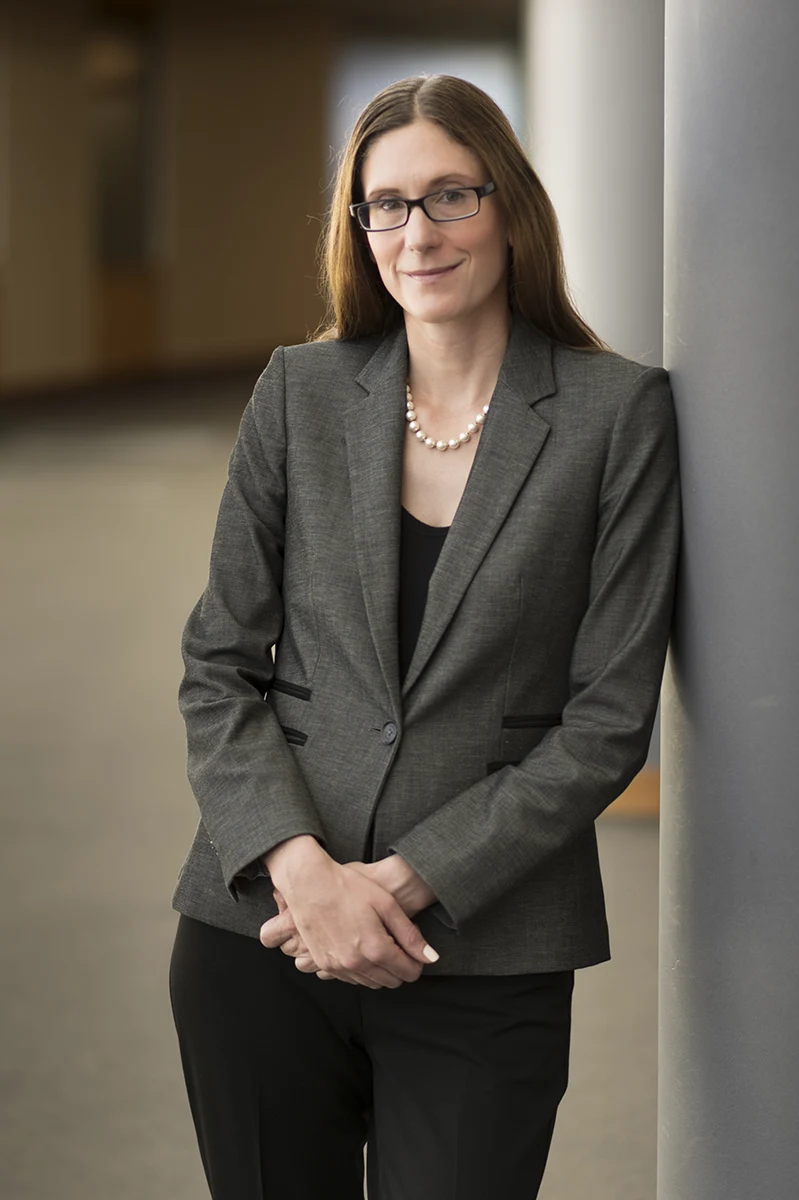
This data does exist, Prowse says. One can find and see staff movement and outcomes for decades.
“They need to be able to do it and bring it back,” she said of students searching for data. “And there’s not a course that directly teaches how to do that.”
Purdue econ students have classes on research methods, and undergraduate RAs will have been introduced to Stata, the software used for advanced statistical analysis and complex data manipulation. Student are taught to do analysis in a scientifically appropriate way, Prowse says – but the research assistant experience is different from coursework in that it’s a longer process and involves archiving.
“The students must be organized. Their code has to be shared,” she says.
Another talented undergraduate, James (Songjun) Jiang, worked mainly on one large empirical project. Prowse involved Jiang on this particular project at the very beginning, through the initial research process where he explored ideas, variables and opportunities.
“We sent him down the rabbit hole,” she says, and he came back with so many “bits and bobs.”
Jiang worked on a complex longitudinal set on gender attitudes in childhood and their link to adult outcomes. He built up his data analysis skills in Stata. The national survey of youth he examined was started in the late 1970s and includes about 10,000 people. The survey follows women and their children and looks at how boys’ and girls’ attitudes about gender change when their mother is married/divorced/remarried/working/not working and so on.
The publicly available data is rich and massive, Prowse says, and Jiang really dug in, pulling all manner of variables.
Prowse also had Jiang work on research much closer to completion and publication.
“Being involved at the end, when journal editors have questions, is an important part of the process,” Prowse says.
Jiang has since graduated Purdue, earned his master’s in econometrics and quantitative economics at Boston University, and is now a research consultant at the World Bank.
The school’s Purdue University Research Center in Economics (PURCE) offers yet another opportunity for dedicated undergraduates to pair with a faculty member for paid research assistantships. The center’s Undergraduate Research Assistantship program mentors a select, small group of undergraduates as they learn research design, quantitative data analysis, database management and presentation skills.
“Our undergraduates get the chance to experience how modern research is conducted, and our faculty get much-needed assistance with their many research projects,” PURCE Kozuch Director Kevin Mumford says.
Cason also helms Purdue’s new Center for Behavioral Economics, Experiments and Public Policy (BEEP). Faculty associated with the new center make research contributions in the field of behavioral and experimental economics to address important public policy and management questions.
Wasting no time, BEEP announced its first event, the Learning, Computational and Bayesian Methods in Experimental Economics workshop. Set for May 2-3, 2024, the workshop will bring together PhD students, postdocs and early career researchers for a hands-on introduction to methods in computational and learning models and structural Bayesian econometric techniques to the field of experimental and behavioral economics.
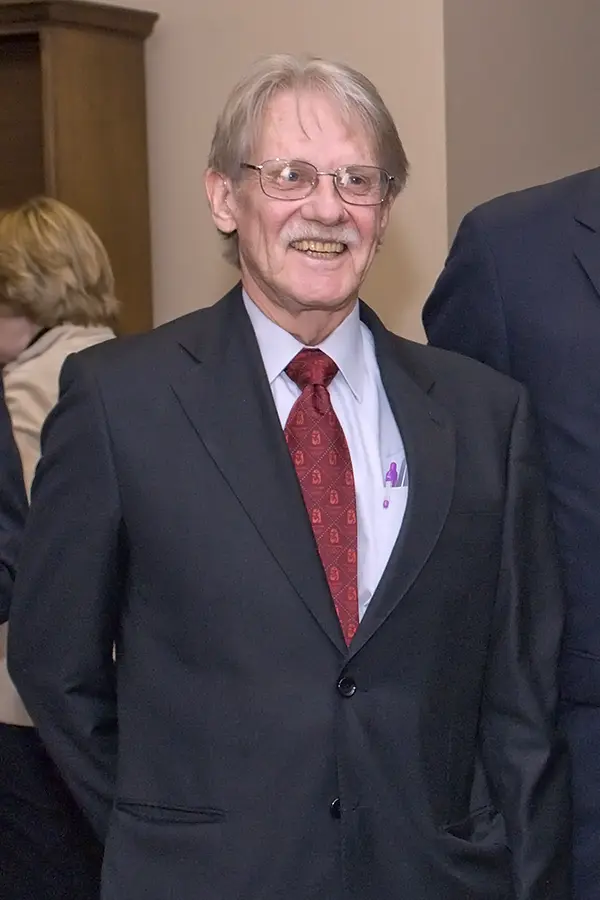
Cason received so many applications to the workshop that he had to reconfigure the event’s capacity. The workshop includes a mentoring lunch that will cover demystifying the publication process and early career strategies — and there is no fee to attend the workshop, thanks to generous funding from the Vernon L. Smith Experimental Economics Education Fund. Attendees will receive grants sufficient to cover their travel, lodging and meal expenses.
The workshop also serves as a celebration of the reopening of the renovated VSEEL lab and brings back to campus the lab’s namesake, Vernon Smith.
Considered a pioneer in the field of experimental economics, Smith’s first teaching appointment was at Purdue’s business school, where he taught from 1955 to 1967. He received an Honorary Doctorate from Purdue in 1989.
Smith won the 2002 Nobel Prize in Economics for establishing laboratory experiments as a tool in empirical economic analysis through work he began at Purdue. Daniels School faculty and staff are eager for his return to campus. Smith is set to give opening remarks at the May workshop.
“It will be wonderful to have Vernon back for another visit,” Cason says. “He has a great fondness for Purdue and has been very supportive, especially for educational workshops, and has returned to campus every few years.”
The school’s new undergraduate degree program, a Bachelor of Science in Quantitative Business Economics (QBE), brings together economic theory, business acumen and statistical techniques to best prepare graduates to lead in the application of data to solve business problems. QBE will welcome students in fall 2024.
Also new to the curriculum is a minor in behavioral economics, bringing the business school’s number of econ minors to four: the Business Economics Minor, the Behavioral Economics Minor, the Economics Minor and the Mathematical Economics Minor. The newest offering equips students interested in not only business but psychology, public policy and other social sciences with the necessary tools to deepen their understanding of human decision-making and its implications for society.